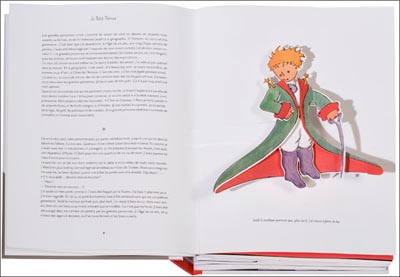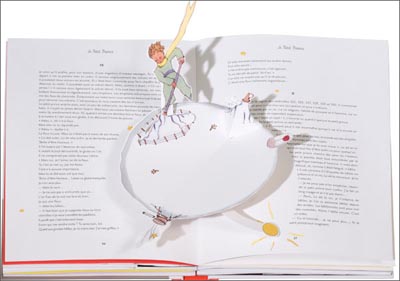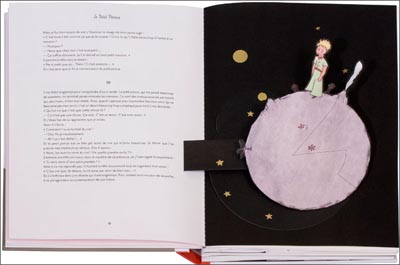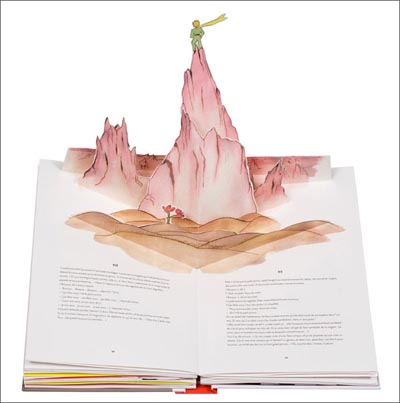| 商家名称 | 信用等级 | 购买信息 | 订购本书 |
 |
进口原装:The Little Prince (Wordsworth Children's Classics) |  |
|
 |
进口原装:The Little Prince (Wordsworth Children's Classics) |  |
![进口原装:The Little Prince (Wordsworth Children's Classics) The Little Prince (Wordsworth Children's Classics) [平装]](http://img.reader8.com/uploadfile/2013/0414/20130414032103330.jpg)
Customer Reviews
1. Timless, poetic translation captures the essential of Exupéry's story, August 30, 2005 — By K. Jones "kitkooh" (Salt Lake City, UT, USA)
Katherine Woods' simple and beautiful translation is the only one that does justice to The Little Prince. Published by Harcourt in 1943 and 1971, her translation is the essential --- the translation loved and quoted by English-speaking people around the world, even by members of English- and French-speaking Canadian Parliament! But hers is OUT OF PRINT, so snatch up used copies while you may!
WARNING: there is a "new translation" out by Richard Howard, and I accidentally got one. Ouch! His "New" translation purges meaning, and is not worth the money. It gives a falseness to one of the most sincere stories ever written.
Howard's lacks beauty, and is at times unintelligible: It simply does not make sense. Since Howard has no apparent understanding of the truths expressed in The Little Prince, it is not to be wondered at. One important example says it all: The fox's "secret" told to the little prince in parting ---
Wood's translation reads: "It is only with the heart that one can see rightly; what is essential is invisible to the eye." She uses the beautiful rhetorical mode: "What is essential..." Compare, if you know French, Antoine de Saint Exupéry's original French text: "...on ne voit bien qu'avec le c?ur. L'essentiel est invsible pour les yeux." "L'essentiel" is in the same mode as is "Les Misérables" -- neither translate exactly into English. "Les Misérables" may be translated as "The Miserable Ones," with less poetic effect. Likewise, "L'essentiel" might be rendered literally "The essential things" or put in the rhetorical form "What is essential..."
If Richard Howard wanted to make the statement "clearer" it would have to read: "That which is essential is invisible to the eye" --- wordy, and prosy, but it keeps the meaning. But Howard doesn't do that; his "new" translation of the same line read: "One sees clearly only with the heart. Anything essential is invisible to the eyes." Huh? "Anything essential is invisible to the eyes"? Far from expressing Antoine de Saint Exupéry's meaning, this generalization means, in effect, nothing. And it is obviously not true: Water is essential, and you can see it.
Katherine Woods' exquisite translation captures the essence of this line for the English reader. "It is only with the heart that one can see rightly; what is essential is invisible to the eye." Quintessential, no line in the book is more important. It epitomizes her entire translation. It is ironic that, in translating The Little Prince, Howard should lose "that which is essential," and that he should be unable to "see with his heart." You can tell the difference between the two by the covers. Woods' shows the little prince on a white background; Howard's is on midnight blue. But check the ISBNs!
Amazon.com's Editorial Review on Howard's translation says that "Katherine Woods sometimes wandered off the mark,
giving the text a slightly wooden or didactic accent. Happily, Richard Howard...has streamlined and simplified to wonderful effect." This would have been better written thus:
"Katherine Woods uses poetic devices and a didactic accent to wonderful effect, capturing the essence and meaning of Antoine de Saint Exupéry's classic in a timeless translation. Unhappily and unfortunately, Richard Howard...has streamlined and simplified in a words-only translation, and he wanders off the mark, obscuring what were otherwise truths both simple and profound, giving the text a slightly wooden effect."
To get the Katherine Woods' translation, make sure you are buying ISBN: 0-15-246507-3. As for Howard's translation, "NEW" is not better; it's just "new." Woods' translation is the one I read, and helped me to understand why I grieved so when my great grandmother died. We'd spent so much time with her. And, as the fox says to the little prince in explaining why HIS rose is so important to him, "It is the time you have wasted for your rose that makes your rose so important." It also helps me keep in mind what I'm doing with my time, and why. If I watch T.V. the most, then T.V. becomes the most important. If I pass time with my family, they become the most important.
Another always-to-be-remembered example of a passage from Woods' translation dealing with the interaction of the little prince and the fox. When the little prince has to say goodbye to the fox, the fox says, "Ah, I shall cry."
"It's your own fault," said the little prince. "I never wished you any sort of harm; but you wanted me to tame you..."
"Yes, that is so," said the fox.
"But now you are going to cry!" said the little prince.
"Yes, that is so," said the fox.
"Then it has done you no good at all!"
"It has done me good," said the fox, "because of the color of the wheat fields."
Before the little prince tamed the fox, the wheat field had "nothing to say to" the fox. "But," he had said to the little prince, "you have hair that is the color of gold. Think how wonderful that will be when you have tamed me! The grain, which is also golden, will bring me back the thought of you. And I shall love to listen to the wind in the wheat..."
I used to dislike giant sunflowers. Then I discovered that someone I love like them very much. So we planted some and cared for them together. Now, when I see giant sunflowers, I remember him and my heart is happy. I understand. Because I read, and re-read, Wood's translation of The Little Prince since I was a child. It is as beautiful today as it was 40 years ago.
--------------
SOURCES:
Katherine Woods' superior translation: NY: Harvest/HBJ Book, Harcourt, 1971, pp. 83, 86, 87. (Katherine Wood's translation)
Richard Howard's inferior translation: 2 San Diego, CA: A Harvest Book, Harcourt Inc., 2000, p.63. Richard Howard's translation.
Original French by Antoine de Saint Exupéry: Le Petit Prince, NY: Harvest/HBJ Book, Harcourt, 1971, p. 87 (ISBN: 0-15-650300-X)
2. EVERYTHING REPRESENTS SOMETHING ELSE, April 10, 1998
— By "donnie@dreamscape.com" (Little Falls, NY USA)
I read the Little Prince when I was a child, and knew that it meant something but wasn't really sure what. For years the book sat on my shelf, always mystifying me. Just yesterday a friend of mine told me she just finished it. We had this amazing conversation and I realized (with her help) that everything really is a metaphor for something else (people who have read the book might understand when I explain). For example, the rose represents a child because the LP (little Prince) loved it and took care of it. When he found the rosebushes he realized that his flower was not special. But it was unique in the way that he had raised it and so it was different from all the other flowers. The sunset = happiness. The LP searched for the sunset wherever he went like a person searching for happiness. The boabobs = bad child. They needed to be tended to while they were little like a naughty child, so that they did not grow up and destroy the planet. The snake = death. He befriends the LP but tells him in some metaphorical way that he is inevitable. Also, it explains itself at the end when the snake kills him. The stars = faith, religion, God. There is a passage in the book that says, the stars are many things to many people. To the wanderers they are a guide, to the scholars they are a problem to solve, to the businessmen they are wealth. The wanderers are like lost souls looking for God, the scholars are theologans looking for proof if God exists, the businessmen are like evangelists who look to God for profit. Also, the king tried to rule the stars but could not because they belonged to everyone. No one can rule God, He belongs to everyone. Lamplighter = devotion. He could have gone to sleep, but insisted on carrying out his duties. The well = faith. The LP and "I" searched for the well in the desert and insisted on it being there, even though they didn't know for sure. This is like a person believing in God even though they've never seen Him. The Turkish Astronomer = descrimination. No on!e listened to his ideas until he changed how he dressed. This represents how people judge other people by appearance. Little Prince Leaving Flower = Child Growing Up. She had her thorns for defense but it was still a transition into life on her own, like a child going into adulthood. King's Robes Covering the Planet = People's possessions cluttering their lives. There was no room for anything else because his robe was in the way. Geographer = law, justice. He was like a judge, carrying out the orders after they were proven. He had his explorers report to him with their findings (like attorneys) and after he had confirmed what happened, he wrote them down. It also represents how he didn't care about the flower unless it was ephemeral--like a judge who doesn't care about anyone unless they have anything to do with his profession. Message of Book = simplify your life. All that The Little Prince had on his planet was a flower and three mountains. He was extraordinarily happy, until he came to the other planets. Everyone else was busy with something, but his simple life made him happy. It was the sunset at the end of the day (or any time of the day) that made his life worth living. All of the other people on the other planets were preoccupied with alcohol, figures, reigning over everyone else, etc, all "matters of consequence," and they weren't happy. The little Prince was happy. Whew!
Copyright 2001 Cahners Business Information, Inc.
From School Library Journal
Grade 2-6-Antoine de Saint-Exupery's classic allegory is presented with the original whimsical watercolor drawings and animation accompanying the translated text. The story may be read alone or with animation and sound. Actor Kenneth Branagh has the role of narrator, and 12-year-old British actor Owen Evans is the voice of the Little Prince. The CD-ROM includes a biography of the author, a diary notebook for users to write in or create their own stationery, panorama pictures, and "The Fox Taming Game." The story will delight young readers, and its meaning will stimulate thinking for older ones. The game to tame the fox involves a lot of waiting and lacks action. The animation, photos, and narration are excellent. Much of the product responds slowly, so patience is required. On screen help and printing are not available except for the diary. Installation is easier on the Macintosh than on the PC. It is necessary to change the number of colors on the monitor and to install the specific version of QuickTime that is included on the CD-ROM. The review copy was a Beta version and did not allow access to all parts of the CD-ROM for review.
Ann Elders, Mark Twain Elementary School, Federal Way, WA
Copyright 2000 Reed Business Information, Inc.
From AudioFile
At first, Richard Gere's pause-laden, melancholic narration seems affected, but as this fable of childhood wonder and adult folly unfolds, the sad, quiet tone feels entirely appropriate. As the Little Prince, guilelessly portrayed by The Sixth Sense's Haley Joel Osment, leaves his tiny planet to journey across the universe, he encounters characters who embody greed and futility, and finally a fox who, in a brief but standout performance by Adam Frost, asks to be tamed. Gentle, contemplative music underscores the story, and by the end, the Little Prince has learned that the weightiest matters in life--bonds of friendship and responsibility--are the most intangible. Saint-Exupéry's pilot has been changed irrevocably by his encounter with the Little Prince; listeners will doubtless feel the same way. J.M.D. ? AudioFile 2001, Portland, Maine-- Copyright ? AudioFile, Portland, Maine
French fantasy at its memorable best in this moving story of the little prince from the tiny planet with the threatening baobab seeds, the three volcanoes and the vain and difficult rose with whom he falls in love. (6-14 yrs) (Kirkus UK) --This text refers to an out of print or unavailable edition of this title.
作者:(法国)圣埃克絮佩里(Saint-Exupery)
圣埃克苏佩里(1900—1944),出生于法国里昂,1921—1923年在法国空军中服役,曾是后备飞行员,后来又成为民用航空驾驶员,参加了开辟法国一非洲一南美国际航线的工作,其间他还从事文学写作,作品有《南线班机》、《夜航》等等。
1939年德国法西斯人侵法国,鉴于圣·埃克苏佩里曾多次受伤,医生认为他不能再人伍参战。经过坚决要求,他参加了抗德战争,被编人2/33空军侦察大队。1940年法国在战争中溃败,他所在的部队损失惨重,该部队被调往阿尔及尔。他随后即复员,只身流亡美国。在美国期间,他继续从事写作,发表了《战斗飞行员》、《给一个人质的信》以及《小王子》。
1943年,在他的强烈要求下,他回到祛国在北非的抗战基地阿尔及尔。上级考虑到他的身体和年龄状况,只同意他执行五次飞行任务,他却要求到八次。1944年7月31日上午,他出航执行第八次任务,从此再也没有回来,牺牲时年仅44岁。
Antoine de Saint-Exupery was born in France in 1900 and had a great passion for flying. Aviation often serves as a theme in his works for more relevant discussions such as search for wisdom and the meaning of life. He was forced to give up aviation and flee to New York after Germany had invated France during world war II. It distrubed him greatly.
插图:



更多图书资讯可访问读书人网图书频道:http://www.reader8.com/book/